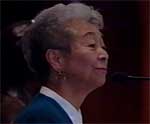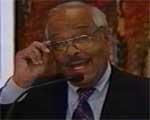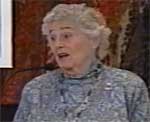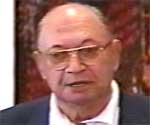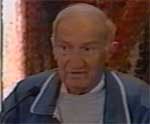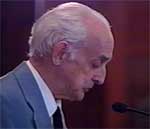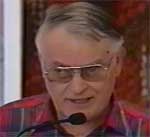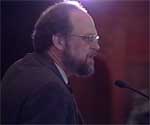On January 29, 1994 the Harry Bridges Center for Labor Studies brought together ILWU veterans, Pacific Northwestern activists, and academics to honor and remember the legacy of Harry Bridges and the tradition of dissent he inspired on the waterfront. Speakers include Noriko Bridges, U.S. District Judge Jack Tanner, former ILWU Coast Committee Administrative Assistant Jean Gundlach, and former ILWU Local 19 Business Manager Martin Jugum. Harry Bridges and the Tradition of Dissent Among Waterfront Workers took place at the Walker-Ames room on the University of Washington campus and was chaired by David J. Olson, the Harry Bridges Chair in Labor Studies from 1992-1994.
Noriko Bridges |
Nikki Bridges was born Noriko Sawada in 1923 in Gardena, California. During World War II, Sawada and her family were forced to spend three years in an Arizona interment camp for Japanese Americans on the West Coast. After her release, she became active in labor and civil rights issues. Sawada met Harry Bridges in Nevada in 1958 and the couple decided to marry soon after, forcing the state of Nevada to overturn a law against interracial marriage. For the next thirty years, both Nikki and Harry committed themselves to the labor movement, civil rights, and economic justice. During these years, Nikki also pursued a writing career and was published in Harpers and Ms. Magazine. After Harry’s death in 1988, Nikki remained active in economic justice and civil rights issues, and keeping the memory of her late husband alive. In 1992 she helped endow the Harry Bridges chair at the University of Washington. Nikki Bridges past away in February 2003. |
Jack Tanner |
Jack Tanner was a dedicated civil rights activist, constant supporter of the ILWU, and the first African-American in the Pacific Northwest to serve on the federal bench. Tanner was born in Tacoma in 1919 and served in the Army during World War II. After returning from the Pacific theater, Tanner attended the University of Puget Sound and later the University of Washington’s School of Law. In law school Tanner joined the NAACP and served as its regional director from 1957 to 1965 and was later appointed to the organization’s national board. A dedicated civil rights attorney, Tanner not only represented African Americans but also Native Americans in their struggles to enforce treaty rights. In 1966, he became the first African American candidate for Washington State governor. In 1978, Tanner was appointed to the 9 th Circuit Court and in 1992 he was elevated to senior court judge. Tanner remained on the bench until his death in 2006. But before he rose to prominence as judge, a crusader for civil rights, and a dedicated activist, Tanner worked on Tacoma’s docks as a member of the ILWU. In this talk Tanner discusses Harry Bridges and the ILWU’s tradition of interracial unionism. |
Jean Gundlach |
For thirty years Jean Gundlach served as the administrative assistant of the ILWU Coast Committee. In practical terms this meant that she worked day-in and day-out with Harry Bridges. Gundlach was born in Missouri and moved to Seattle in the 1940s. In 1946 she began work as secretary of the Committee for Maritime Unity, and later worked for the United Fisherman and Allied Workers of America (UFAWA). When the UFAWA merged with the ILWU in the 1960s, Gundlach went to work for the ILWU and Harry Bridges. Throughout her life, Gundlach has been devoted to progressive causes, working with migrant farm workers in the 1950s and even leading a “walk out” when Harry and the ILWU titled officers did not treat staff as they should. In the 1990s Gundlach was instrumental in forcing then-UW president William Gerdberding to issue a formal apology to the victims of the Canwell Committee trials. In 1992 she was a central in the creation of the Harry Bridges Chair in Labor Studies and in 2008 she was awarded the Harry Bridges Center for Labor Studies’ Robert Duggan Distinguished Supporter of Labor Studies Award. |
Martin Jugum
|
Martin "Jug" Jugum may have only referred to himself as a “working stiff,” but for over fifty years he was a key figure in the ILWU and central to the creation of the Harry Bridges Chair in Labor Studies at the University of Washington. Jugum was born in Seattle in 1915 and raised in Aberdeen. In 1938, he went to work on the waterfront and joined the ILWU. Like many longshoremen, "Jug" joined the Army during World War II. After serving in Europe and on Omaha Beach during the D-Day invasion, he returned to Seattle and the waterfront. Jugum held many elected positions in the ILWU, including business agent of Local 19, before his retirement in 1977. As the president of the Local 19 Pensioner’s Association in the 1980s and early 1990s, Jugum remained a dedicated supporter of the labor movement. In 1992, Jugum co-chaired the Harry Bridges Memorial Committee which established the Harry Bridges Chair in Labor Studies. "Jug" passed away in 1996. |
Pete Grassi
|
Pete Grassi was the secretary-treasurer of the ILWU’s Southern California Pensioner’s Club. Grassi was born in 1910 in Chicago and moved to California in 1919. He started working on the waterfront in 1928 and was active in the ILA’s efforts to win coast-wide union recognition in the 1930s and the coast-wide longshoremen’s strike in 1934. In this talk, Grassi talks about life on the waterfront in the 1930s and the influence Harry Bridges had on longshoremen throughout the twentieth century. |
Jeff Stranahan
|
Jeff Stranahan was secretary-treasurer of the ILWU’s Columbia River District Pensioner’s Association. He was a steadfast member of the ILWU for over 48 years and dedicated to the principles of organized labor. Here, Stranahan talks about Harry Bridges’ relationship with rank-and-file ILWU members and the trust he put in them. |
Ron Magden
|
Ron Magden’s passion for teaching and writing about Pacific Coast longshoremen has spanned many decades. He is author of many books, including The Working Waterfront, and A History of Seattle’s Waterfront Workers. Magden has been crucial to the development of this on-line history project. A full interview with him can be viewed in our oral history section, and his photo collection can be viewed in our image repository. |
Fred Haley
|
Fred Haley was a champion of both civil rights and academic freedom in the Pacific Northwest. As president of the Tacoma School Board in the 1960s he advocated for the hiring of African American teachers in the Tacoma public school district and he served on the Washington State Committee for Academic Freedom. Here, Haley talks about the threats to academic freedom caused by the Canwell Committee and former UW president William Gerdberding’s formal apology to the victims of the Canwell trials. |
Bruce Nelson
|
Bruce Nelson is a professor of history at Dartmouth University. His research has explored issues of race, class, and interracial unionism in the twentieth century American labor movement. He is author of Workers on the Waterfront and Divided We Stand. In his talk, Nelson discusses Harry Bridges, the ILWU, and race relations during the civil rights era. |
Robert Cherny
|
Robert Cherny is professor of history at San Francisco State University. In addition to writing about Progressive-era politics, Populism, and labor in the cold war, he has delivered numerous papers about the life and influence of Harry Bridges. He is author of American Labor and the Cold War and A Righteous Cause, a biography of William Jennings Bryan. His talk here discusses Harry Bridges and labor radicalism on the Pacific Coast. |
